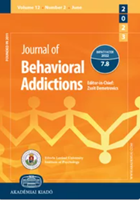Emotional processing deficits in individuals with problematic pornography use: Unpleasant bias and pleasant blunting
Emotional processing deficits in individuals with problematic pornography use: Unpleasant bias and pleasant blunting
Author(s): Jianfeng Wang, Hong LiuSubject(s): Individual Psychology, Behaviorism, Substance abuse and addiction, Health and medicine and law
Published by: Akadémiai Kiadó
Keywords: problematic pornography use; emotional processing; compulsive sexual behavior; event-related potentials;
Summary/Abstract: Background and aims: A growing body of evidence indicates a connection between emotional processes and the emergence and progression of addiction. However, scant research has examined the involvement of emotional processing within the framework of problematic pornography use (PPU). This study aimed to examine the electrophysiological and subjective differences in emotional processing between male individuals with PPU and healthy controls (HCs) following exposure to everyday affective images. Methods: Event-related potentials (ERPs) were recorded from 42 PPU participants (mean age 5 20.14 years, SD 5 1.35) and 45 HCs (mean age 5 20.04 years, SD 5 1.45) during an oddball task, in which unpleasant, pleasant, and neutral images were presented as deviant stimuli, while a neutral kettle image served as the standard stimulus. The Self-Assessment Manikin (SAM) was employed to assess participants’ subjective experience on the dimensions of valence and arousal. Results: Regarding subjective measures of emotion, individuals with PPU reported lower valence ratings for unpleasant images compared to HCs. In terms of electrophysiological measures of emotion, PPU participants reported larger P2 amplitudes for unpleasant pictures compared to both pleasant and neutral pictures. Moreover, HCs showed enhanced P3 amplitudes in response to pleasant images compared to neutral images, whereas this effect was not observed in PPU participants. Discussion and Conclusion: These findings indicate that individuals with PPU may display deficits in emotional processing characterized by enhanced responsiveness to negative stimuli and attenuated responsiveness to positive stimuli. The heightened sensitivity to negative stimuli may contribute to the inclination of individuals with PPU to engage in pornography as a coping mechanism for stress regulation. Conversely, their diminished sensitivity to positive stimuli presents a challenge in seeking alternative natural rewards to counter potentially addictive behaviors.
Journal: Journal of Behavioral Addictions
- Issue Year: 12/2023
- Issue No: 4
- Page Range: 1046-1060
- Page Count: 15
- Language: English

